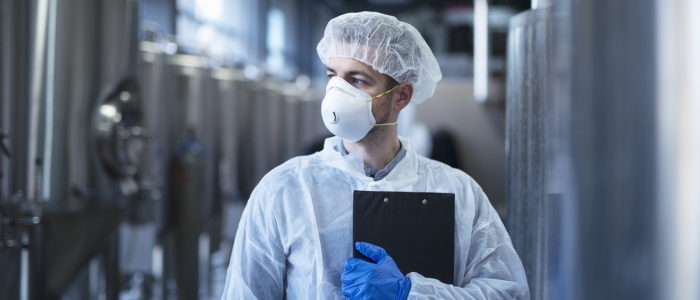
Diversey - the leading global hygiene and cleaning company – has applied its acknowledged expertise in the Food and Beverage (F&B) sector to provide key safety advice designed to protect against airborne transmissionof Covid-19 in food production and processing facilities.
This has been developed by the company in response to the recent increase of infection in plants across Europe.
These multiple outbreaks come in what has already been a severely testing time for the industry, endeavouring to continue production in the difficult environment createdby the pandemic despite having fewer employees, and with increased absence due to infection and self-isolation.
Working in Close Proximity
Throughout Europe there has been an increasing number of large scale outbreaks ofinfection in a diverse range of production facilities. In the UK alone, this has extended across factories that handle everything, from chilled supermarket ready meals, to meat processing, to snack foods.
Hein Timmerman, Global sector specialist – Diversey, comments: “Initially the investigation into the primary causes of outbreaks in Food production facilities has seen the focus directed toward typical working practices in F&B plants - such as the close proximity of workers in production lines. External factors have also been highlighted. These include the transient nature of workforces - who routinely share accommodation - and are then transported to work together; where they will also be close to each other for long shifts.”
Something in the Air
Resetting, reopening and the scaling up of production often takes place in factory environments that incorporate closed, indoor spaces with inadequate ventilation. With heavy physical work - such as in meat processing - staff breathe heavily from the effort involved; or have to shout above the loud noise of production machinery.
It has been identified that workers can spread infection in droplets from coughing, sneezing, or simply exhaling breath. Consequently, factories and, in particular,
indoor areas which are cold (refrigerated areas) and damp, are being identified as perfect environments for coronavirus to linger and spread.1
Change to the WHO Guidelines
The World Health Organisation (WHO) initially ruled out airborne transmission, contending that Covid-19 is spread mostly through respiratory droplets, usually from sneezes or coughs. This has now been re-evaluated due to evidence and broader lobbying by scientists engaged in emerging research and with the recent factory outbreaks in mind.2
The key outcome is that in certain indoor conditions workers could be at greater risk of being infected than was previously accepted. The WHO has subsequently revised its guidelines on two key issues concerning how the new coronavirus spreads, saying people who are talking or singing may expel the virus through tiny airborne particles that float through cramped and unventilated spaces.3
Aerosols as Infection Vectors
As Covid-19 is thought to be primarily transmitted via large respiratory droplets, an increasing number of outbreak reports implicate the role of aerosols in indoor environments - with the duration of infectivity depending on temperature and humidity.
Hein concludes: “In order to ensure a safer working environment and reduce the risk of infection transmission by air handling systems, Diversey has created essential guidance for the F&B production industry. This details methods to increase air qualityand reduce the risk of transmission. It is timely insight due to the growing body of factory evidence, and the WHO’s acceptance of developing scientific research of the potential threat involved. Diversey has always operated in partnership with our customers and with a strong recognition of our role and responsibility to the industry. These guidelines are simply another aspect of how we are supporting the industry in these very difficult circumstances.
”For your copy of Diversey’s New Air Handling Guide, please visit: https://diversey.com/en/blog/considerations-improving-facility-air-quality
- https://www.bbc.co.uk/news/531376132
- https://www.nytimes.com/aponline/2020/07/06/health/ap-eu-med-virus-outbreak-airborne-coronavirus.html
- https://www.wsj.com/articles/who-allows-for-coronavirus-transmission-by-tiny-air-particles-before-symptoms-11594332381



